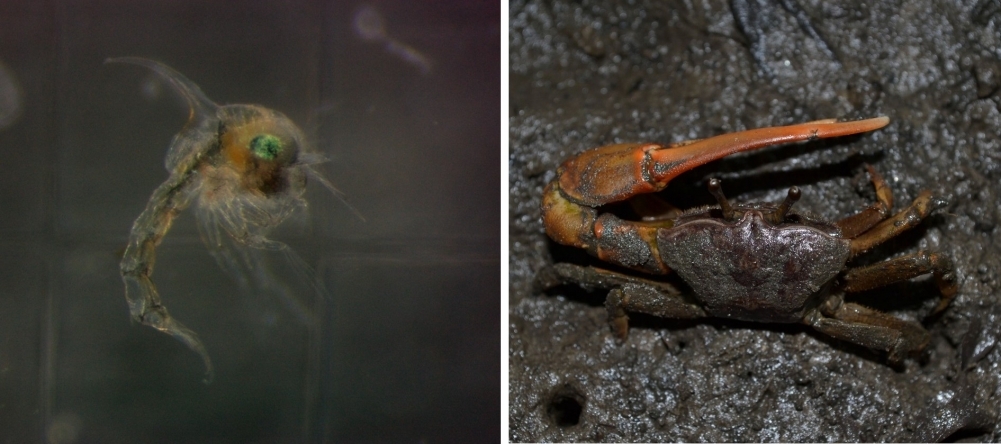

Larvae of the Atlantic mangrove fiddler crab (Leptuca thayeri, left) survived less in warmer water and underwent physiological changes due to higher acidity. On the right, an adult individual (photos: Murilo Marochi)
In an experiment, the survival and physiology of crab larvae on which other species feed were affected by rising sea surface temperatures. Events of this kind will be up to 35% more frequent between now and the end of the century in the study area.
In an experiment, the survival and physiology of crab larvae on which other species feed were affected by rising sea surface temperatures. Events of this kind will be up to 35% more frequent between now and the end of the century in the study area.

Larvae of the Atlantic mangrove fiddler crab (Leptuca thayeri, left) survived less in warmer water and underwent physiological changes due to higher acidity. On the right, an adult individual (photos: Murilo Marochi)
By André Julião | Agência FAPESP – An increase in marine heatwaves due to global climate change in the coming decades will have a significant impact on lifeforms in this environment, including those at the bottom of the food chain, according to a paper published in Estuarine, Coastal and Shelf Science by Brazilian researchers working in Brazil, Norway and the United States,
Marine heatwaves are periods of more than five days with water temperatures more than 90% above the historical average for the region. Projections point to a rise of 35% in the frequency of marine heatwaves by the year 2100 for the Santos-São Vicente area (coast of São Paulo state, Brazil) in which the study reported by the paper was conducted. It is important to distinguish between marine and atmospheric heatwaves, the latter typically being more intense but affecting mainly terrestrial environments, including cities.
The researchers evaluated the potential impact of marine heatwaves on planktonic larvae of the Atlantic mangrove fiddler crab Leptuca thayeri. “Although the larvae survived a rise in the acidity of the water, a rise of 2 °C in sea surface temperature during the first three to four days of their lives led to a 15% drop in the survival rate compared with larvae at the average temperature for the region. A rise of 4 °C led to a 34% rise in mortality,” said Murilo Zanetti Marochi, first author of the paper. The study was conducted while he was on a postdoctoral research fellowship at the Institute of Biosciences of the São Paulo State University’s Coast Campus (IB-CLP-UNESP) in São Vicente.
The study was part of a project to investigate the impact of climate change on estuarine fauna in São Paulo state, under the aegis of the FAPESP Research Program on Global Climate Change (RPGCC), and was conducted in partnership with Alvaro Montenegro, a professor at Ohio State University in the US.
“This species is extremely abundant in mangrove forests in the Mar Pequeno estuarine region, where the study was conducted. After the eggs hatch, the larvae stay there for a few days and then migrate to the ocean. Fewer than 1% return to complete their life cycle. Most become food for other species. For this reason, among others, this little crab plays an important role in the ecosystem” said Tânia Marcia Costa, last author of the paper and a professor at IB-CLP-UNESP.
Warmer future
In a previous study, Costa and Juan Carlos Farias Pardo, then a master’s candidate, showed how warming and acidification reduced the survival rate of embryos of L. thayeri. The temperature rise simulated in that study was based on the forecast for the end of the century made by the Intergovernmental Panel on Climate Change (IPCC) (read more at: agencia.fapesp.br/36109).
In the recent study, also co-signed by Pardo, currently a PhD candidate at the University of Agder in Norway, no significant differences were found in larva survival due to the increased acidity, but physiological changes were observed. Marine PhD is expected to fall in the coming decades, and this will affect many species.
“Estuaries naturally undergo major variations in acidity, and the species will probably tolerate a rise in this parameter to some extent,” said Marochi, currently affiliated with the State University of Paraná (UNESPAR) at Paranaguá (Brazil).
However, high acidity, like higher temperatures, heightens physiological stress on the crabs by accelerating their heart rate and reduces their mobility. “They swim less and may not be able to stay in the water layer closest to the surface, where the microalgae they feed on live,” he explained.
In sum, the effects of marine heatwaves will be harmful to the species and those that feed on it, with potential economic losses to fisheries, for example. However, there are no studies that confirm a fall in stocks of L. thayeri in the last 20 years. For the authors of the paper, this may be due to other factors that are offsetting the changes. For example, the warmer sea surface temperature may enable the larvae to develop more quickly, so that they are less exposed to predators and severe environmental conditions. The rise in temperature may also increase the production of microalgae and microorganisms on which they and other species feed.
More research will be needed to find out whether these effects offset the rise in mortality of the larvae, and if so, how much.
The article "Marine heatwave impacts on newly hatched planktonic larvae of an estuarine crab” is at: www.sciencedirect.com/science/article/abs/pii/S0272771422003808.
Republish
The Agency FAPESP licenses news via Creative Commons (CC-BY-NC-ND) so that they can be republished free of charge and in a simple way by other digital or printed vehicles. Agência FAPESP must be credited as the source of the content being republished and the name of the reporter (if any) must be attributed. Using the HMTL button below allows compliance with these rules, detailed in Digital Republishing Policy FAPESP.





